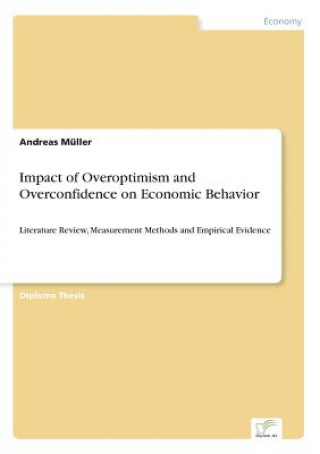
Kód: 02413831
Impact of Overoptimism and Overconfidence on Economic Behavior
Autor Andreas Müller
Inhaltsangabe:Introduction: Economic theory normally focuses on rational agents optimizing individual utility. Since the second half of the 20th century, this viewpoint has been enriched by findings from the field of psychology. ... celý popis
- Jazyk:
 Angličtina
Angličtina - Vazba: Brožovaná
- Počet stran: 82
Nakladatelství: Diplom.de, 2007
- Více informací o knize

Mohlo by se vám také líbit
-

Chemical Neurobiology
5094 Kč -

Love Poems from God
521 Kč -

Old Texts, New Practices
2350 Kč -

Migration and Insecurity
1942 Kč -

Vražedná tajemství a další příběhy
446 Kč -

DIX-NEUF SECONDES
297 Kč -

Aufbau und Charakterisierung eines Systems zur Mikrobearbeitung mit Ultrakurzpulslaser
1376 Kč
Darujte tuto knihu ještě dnes
- Objednejte knihu a zvolte Zaslat jako dárek.
- Obratem obdržíte darovací poukaz na knihu, který můžete ihned předat obdarovanému.
- Knihu zašleme na adresu obdarovaného, o nic se nestaráte.
Více informací o knize Impact of Overoptimism and Overconfidence on Economic Behavior
Nákupem získáte 210 bodů
 Anotace knihy
Anotace knihy
Inhaltsangabe:Introduction: Economic theory normally focuses on rational agents optimizing individual utility. Since the second half of the 20th century, this viewpoint has been enriched by findings from the field of psychology. A new trait of research was created called żbehavioral economicsż. It takes into account subjective characteristics such as asymmetric preference and judgment, or limits of rational processing, willpower, and greed. This paper aims to give an overview of two related human traits that have attracted particularly wide interest, namely overconfidence and overoptimism. The two are closely related to each other, and often used synonymously. Broadly speaking, overconfidence results in underestimation of future risks, e.g. the riskiness of future cash flows, whilst overoptimism leads to an overestimation of future positive outcomes, e.g. the future returns of a company. Besides, the paper wants to deduct suggestions for further research, by systematically identifying uncovered topics in existing literature. Usually Alpert and Raiffa are credited with the first discovery of overconfidence. However, the most influential study is probably Russo and Schoemaker. It was published in the Sloan Management Review and communicated the topic to a broader audience for the first time. In particular, it revealed that assumingly rational managers were prone to overconfidence, too. This challenged traditional management doctrines and generated interest in a better understanding of the topic and further research. To exemplify overconfidence, Russo and Schoemaker asked managers to give numerical intervals for ten general-knowledge questions, such that nine out of the ten answers would be correct. On average participants included the correct value within their interval only 5 out of 10 times, i.e. they underestimated potential errors in their estimations. Svenson is probably the most influential source regarding overoptimism. He made the subject intuitively understandable and established a standard measurement method that could be easily used for subsequent research. To give an example of overoptimism: Svenson asked students to compare their driving skills to those of their classmates. Roughly 80% believed they belonged to the top 50%, i.e. they overestimated their abilities. This paper also provides a closer look at the empirical methods normally applied in field studies. Although the phenomena are intuitively understandable, empirical research [...]
 Parametry knihy
Parametry knihy
Zařazení knihy Knihy v angličtině Economics, finance, business & management Business & management Management & management techniques
2102 Kč
- Plný název: Impact of Overoptimism and Overconfidence on Economic Behavior
- Podnázev: Literature Review, Measurement Methods and Empirical Evidence
- Autor: Andreas Müller
- Jazyk:
 Angličtina
Angličtina - Vazba: Brožovaná
- Počet stran: 82
- EAN: 9783836606295
- ISBN: 3836606291
- ID: 02413831
- Nakladatelství: Diplom.de
- Hmotnost: 118 g
- Rozměry: 210 × 148 × 5 mm
- Datum vydání: 31. October 2007
Oblíbené z jiného soudku
-

High Output Management
394 Kč -

Principles
603 Kč -

The Five Dysfunctions of a Team
512 Kč -

The Making of a Manager
462 Kč -

Turn The Ship Around!
306 Kč -

Hooked
358 Kč -

Inspired - How to Create Tech Products Customers Love, 2nd Edition
592 Kč -

Give and Take
286 Kč -
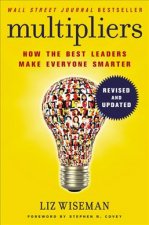
Multipliers, Revised and Updated
295 Kč -

Devil Take the Hindmost
401 Kč -

Traction
397 Kč -

The 4-Hour Workweek
505 Kč -

The Daily Stoic
349 Kč -
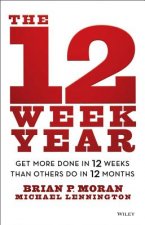
12 Week Year - Get More Done in 12 Weeks than Others Do in 12 Months
484 Kč -
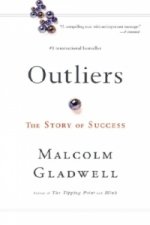
Outliers
244 Kč -

Way, the Enemy, and the Key
1028 Kč -

Leadership BS
746 Kč -

Managing Change in Organizations
812 Kč -

Triggers
286 Kč -

Scrum
316 Kč -

7 Habits of Highly Effective People
467 Kč -

Drive
303 Kč -

New One Minute Manager
286 Kč -

Wooden on Leadership
650 Kč -

Spiral Dynamics - Mastering Values, Leadership and Change
845 Kč -

Leaders Eat Last
338 Kč -

The 7 Habits of Highly Effective People
603 Kč -

How Women Rise
306 Kč -

Dealing with Difficult People (HBR Emotional Intelligence Series)
399 Kč -
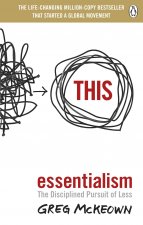
Essentialism
358 Kč -

Million Dollar Habits
460 Kč -

Unlimited Memory
404 Kč -

Standard for Portfolio Management
1466 Kč -

Primal Leadership
549 Kč -
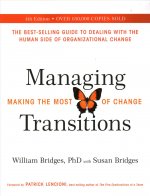
Managing Transitions
517 Kč -

I Dare You!
117 Kč -

Executive Coaching with Backbone and Heart - A Systems Approach to Engaging Leaders with Their Challenges 2e
1621 Kč -

27 Challenges Managers Face
647 Kč -

Economist Guide to Financial Management 3rd Edition
614 Kč -

It's Not the How or the What but the Who
562 Kč -

Millionaire Fastlane
579 Kč -

Extreme Ownership
582 Kč -

Leaders Eat Last
306 Kč -

The Coaching Habit
498 Kč -

Professional Product Owner, The
811 Kč -
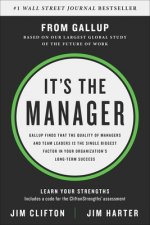
It's the Manager
832 Kč -
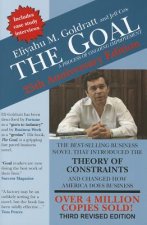
Goal
501 Kč -

Co-Active Coaching
864 Kč -

The 10X Rule
520 Kč
Osobní odběr Praha, Brno a 12903 dalších
Copyright ©2008-24 nejlevnejsi-knihy.cz Všechna práva vyhrazenaSoukromíCookies



 Vrácení do měsíce
Vrácení do měsíce 571 999 099 (8-15.30h)
571 999 099 (8-15.30h)